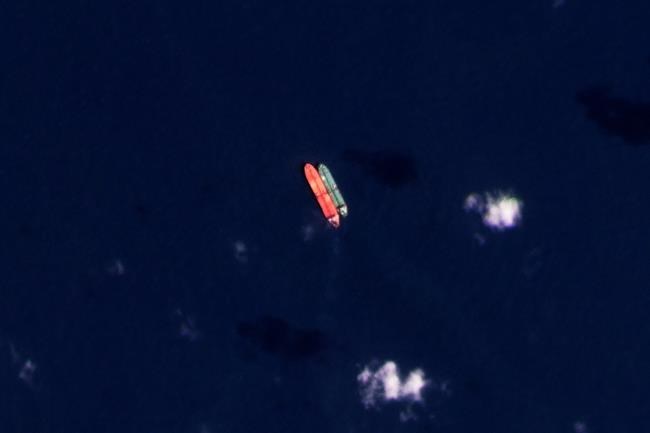DUBAI, United Arab Emirates (AP) — A Greek shipper has pleaded guilty to a charge over it smuggling sanctioned Iranian crude oil and agreed to pay a $2.4 million fine, U.S. federal court papers seen Thursday by The Associated Press show.
Empire Navigation agreed to be put on corporate probation under the plea agreement, according to the federal court filings.
The charge stems from the saga over the oil tanker Suez Rajan, which has become mired in the wider tensions between the U.S. and the Islamic Republic even as Tehran and Washington work toward a trade of billions of dollars in frozen Iranian assets in South Korea for the release of five Iranian Americans held in Tehran. Iran has been trying to evade sanctions and continue selling its oil abroad, while the U.S. and its allies have been seizing cargoes since 2019 after the country’s nuclear deal allowing the trade collapsed.
Attention focused on the Suez Rajan beginning in February 2022, when the group United Against Nuclear Iran said it suspected the tanker carried oil from Iran’s Khargh Island, its main oil distribution terminal in the Persian Gulf.
For months, the ship sat in the South China Sea off the northeast coast of Singapore before suddenly sailing for the Gulf of Mexico without explanation. The vessel discharged its cargo to another tanker, which released its oil in Houston, Texas, in recent days. The court documents seen Thursday confirm the U.S. government seized the oil.
A lawyer for Empire Navigation, Apostolos Tourkantonis, pleaded guilty to a single charge of violating the sanctions on Iran. Empire, based in Athens, Greece, did not immediately respond to a request for comment early Thursday.
Mark Wallace, a former U.S. ambassador to the United Nations under President George W. Bush who heads United Against Nuclear Iran, praised Empire Navigation for agreeing to the plea deal.
“They faced down Iranian assassination threats in Greece,” Wallace told the AP. “They took the off ramp to leave the mob.”
Wallace declined to elaborate and the U.S. court documents offered no detail on the alleged threat. However, the delay in offloading the Suez Rajan’s cargo had become a political issue as well for the Biden administration as the ship had sat for months in the Gulf of Mexico, possibly due to companies being worried about the threat from Iran.
Since the Suez Rajan headed for America, Iran has seized two tankers near the Strait of Hormuz, including one with cargo for U.S. oil major Chevron Corp. In July, the top commander of the Revolutionary Guard’s naval arm threatened further action against anyone offloading the Suez Rajan, with state media linking the recent seizures to the cargo’s fate.
Iran has continued to make threats over the seizure and summoned a Swiss diplomat in Tehran to express its anger. Switzerland has looked after U.S. interests in Iran since the 1979 U.S. Embassy takeover and hostage crisis.
Iran's mission to the United Nations did not immediately respond to a request for comment.
In its 2015 nuclear deal with world powers, Iran regained the ability to sell oil openly on the international market. But in 2018, then-President Donald Trump unilaterally withdrew from the accord and reimposed American sanctions. That slammed the door on much of Iran’s lucrative crude oil trade, a major engine for its economy and its government. It also began a cat-and-mouse hunt for Iranian oil cargo — as well as series of escalating attacks attributed to Iran since 2019.
The U.S. Navy has increased its presence steadily in recent weeks in the Mideast, sending the troop-and-aircraft-carrying USS Bataan through the Strait of Hormuz and considering putting armed personnel on commercial ships traveling through the strait to stop Iran from seizing additional ships.
Late Wednesday, the U.S. put out an updated warning to shippers traveling through the Mideast, warning: “Commercial vessels transiting through the Persian Gulf, Strait of Hormuz and Gulf of Oman continue to be illegally boarded and detained or seized by Iranian forces.”
This year, however, Iranian oil exports have mostly been above 1 million barrels a day despite American sanctions, according to the commodity data firm Kpler. In May and June, it went above 1.5 million barrels a day, with figures in August sitting at 1.4 million barrels daily, Kpler's data showed. China is believed to be a major buyer of Iranian oil, likely at a significant discount.
“Justice was served,” Wallace said. “At the same time, there needs to be a serious policy review on why it took so long and why there are 300 vessels out there doing the same thing.”
___
Find more AP coverage of the Middle East at https://apnews.com/hub/middle-east
Jon Gambrell, The Associated Press



